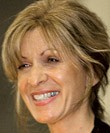'When we find our line of sight, then work becomes more than a job'
By Mary George Opperman
At the time you read this, more than 1,000 Cornellians -- alumni, students, staff, faculty, friends and trustees -- will be gathered in New York City for "Big Red in the Big Apple," a celebration of "bold ideas and big aspirations." The event is showcasing Cornell's achievements, impacts and goals as the university continues to develop the leaders of tomorrow and pursue the paths of innovation.
What does this have to do with the staff at the Ithaca or Geneva campus, or at the Shoals Marine Lab or Weill Cornell Medical College or in our many remote locations across the globe? I believe it has everything to do with what staff members do every day -- or perhaps more accurately, we can see the work of staff in the exciting plans for Cornell's future, just as we can find the fruits of their efforts in Cornell's many achievements.
It is fairly easy to see how faculty and researchers contribute to bold ideas and big aspirations -- they originate them. It is even fairly easy to see how those who work in student services help develop the leaders of tomorrow -- they assist students by supporting them in their academic pursuits and toward their personal well-being. Staff members who work in the dining and residence halls directly impact the lives of students, as Jay Taylor '80 would attest. Because of the care shown to him by Joanie Reigle, the administrative assistant to the head resident of Clara Dickson Hall, during his four undergraduate years, Jay provided the funding to name an advising office room in the Carol Tatkon Center in Joanie's honor. Every day the staff who interact with our students have the opportunity to be part of the lives of these amazing young people.
But, what about the staff person who is located in one of Cornell's offices off campus? Or the person who places a newly hired staff or faculty member on payroll? Or the individual writing code for the university's information technology systems, the staff taking care of the mice or the horses or our dairy herd, or those at Weill Cornell Medical College who sterilize instruments? There are scores of dedicated staff members whose work is not so visibly connected to educating tomorrow's leaders or advancing innovations. Yet that work is inexorably linked to the university's core missions, and it is helpful to remind ourselves of this fact when the tasks of the day begin to feel like ends in and of themselves.
"Line of sight" is a physics term that refers to the directing of sight in a specific direction. Each staff or faculty member might have a different "line of sight" to the university's goals, but we each have the opportunity to contribute to those goals, both in what we do every day and in how we contribute to the Cornell community:
- How we interact with each other defines the inclusiveness of our environment, even in something as simple as helping someone new to campus find the right building.
- If we provide other staff and faculty with excellent customer service, they can go back to their jobs with better focus and in a better frame of mind, and provide better customer service to the students and faculty with whom they are engaged.
- If our job resolves just one concern that a faculty member or researcher might have, that helps free up his or her mental space to concentrate on the research and teaching at hand.
- If we find ways to get involved with students -- by taking a class, going to a lecture, volunteering for Commencement or some other event -- we positively impact the environment of that event.
Each of us contributes to the goals of the university, even in the most remote of locations and with the most specialized of responsibilities. When we remember our connections to the whole -- when we can find our line of sight -- then our work becomes more than a job, more than a series of tasks. There will always be problems to be solved, frustrations to overcome and improvements to be made. Cornell is a big, complicated, sometimes chaotic and confusing place. It is within all of that hubbub that the exciting educational opportunities and knowledge advancements occur. Each of us, in our own way, helps to make the good things happen through our daily work and our daily efforts to positively contribute to the Cornell community.
And our collective efforts will continue to contribute to the local, regional and global achievements and aspirations that are being celebrated at "Big Red in the Big Apple."
Media Contact
Get Cornell news delivered right to your inbox.
Subscribe